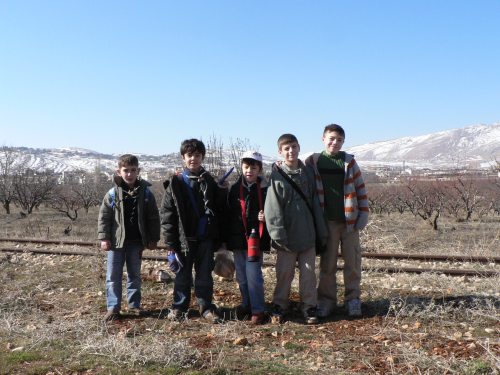[gallery]
No one in our family was taking the bacaloria tests this year, which left my brother-in-law free to plan his wedding for June 28.
Syrian weddings happen in stages and include some interesting traditions – some of these are sweet and some of them left us rolling our eyes.
Muslim weddings are not usually arranged, as many in the West believe. Each country has its own rituals and traditions, which throughout the Muslim world have some common necessities, such as two witnesses, a dowry, etc., but beyond that the proceedings vary greatly.
Among practicing Muslims, however, one of the commonalities is that there is no dating just for the sake of fun – no sewing of “Girls Gone Wild” oats, no neurotic playing of the field. When a person has reached the point in their life when they are ready to marry, they either tell their mother about a person they’re interested in, or they simply have their mother put the word out. The vast and intricate system of motherly acquaintances often does the rest. A neighbor’s husband might have a cousin who is looking to marry, and the word will be passed along and a meeting set up. Often the first meeting includes just the women of the family, including the potential bride but not the groom. If the ladies get along and are impressed with the bride, a second meeting will be set up to which the groom is invited (this meeting is again conducted between just the women, with the exception of the tie-fidgeting, conversation-stammering groom.)
If there is a spark between the two intendeds, then the men are finally brought in. They have meetings among themselves, but this part gets a little fuzzy for me, watching from the ladies’ side of the gallery. The first official step is that they read Al Fatiha (the opening chapter of the Qur’an) together. This means that both the bride and the groom accept the idea of the marriage in the abstract, and that bride and groom can begin to communicate – in the presence of a chaperon or on the phone, email, chatting, etc.
During this stage the couple begins to get to know each other. Their relationship is usually shy and twittery at first, but during this time deepens and broadens as they explore important topics: do they have similar outlooks on childrearing, religious practice, money matters, etc.? I know one couple who took turns asking each other one serious question each night. These ranged from “What do you do when you get angry”, to “What is the father’s role in child rearing?” to “Are you a patient person by nature?”. If they are each still interested after a period of about a month, then the negotiations begin in earnest.
Westerners might be a little put off by the term “negotiations”. It sounds so dry, so businesslike, reducing marriage to so much haggling between potential interests. In reality, though, it is a refreshingly healthy way to go about marriage preparation. Thinking with the mind and having one’s family there to arrange not only a solid agreement about how the marriage will be conducted, but also a good foot forward in the in-law department. At this stage couples decide things like who from their family will be their chosen advocate if there are marital difficulties, and this is written into the contract. Women often put clauses into their marriage contracts like, “Husband agrees to pay for wife’s continued education”, “husband agrees to wife working outside the home” (or NOT working outside the home, which is becoming more common as people’s expectations change from women not working to women working), “husband agrees not to take another wife”, etc. Men sometimes include things like, “Wife agrees to stay home and raise children when they are young”, etc., but the primary focus of the contract is to protect the rights of the woman. Toward this end, one of the most important things it includes is the dowry. Unlike Western dowry traditions, in Islam the dowry is given to the woman from the man. A woman can stipulate any dowry amount she likes, and the usual arrangement is for the dowry to be split into two parts – one given when the couple is married and the other deferred in case of divorce. That way if the couple divorces the woman will have some financial stability. (Of course the husband must still support the children, but there is no concept of alimony. Interesting side note – men pay their child support because the social consequences of being a dead-beat dad are astronomical.)
When the contract details have been worked out the document is signed and a party held. This is called a “kutub al kitab” party (writing of the book). At this point the couple is technically married. Most often, though, they don’t move in together. This is the stage of the relationship that Westerners would associate with being engaged. They can go out alone, the groom can see the bride without her hijab, and they spend a lot of time eating dinner or going out with one side of the family or the other. If they consummate at this stage it is not haram, because they are already married. Most people don’t though, they prefer to wait until the actual wedding night. When the wedding date gets near people go and register their marriage with the government, but this is considered totally separate from the actual marriage. This “kitab” period lasts anywhere from a month to about six months, usually, and if they decide not to marry during this time they must officially divorce, although it is easier than a divorce after they’ve consummated the marriage.
All the while, the couple is working on furnishing their new house. When that is done and the wedding is only a few days away there is a “Ceremony of Putting the Bride’s Clothes in Her Closet”. The ladies of both sides of the family go to her new house and arrange all her clothes, especially her trousseau, carefully in her closet. Sometimes this is done without the bride present, because some couples prefer for the bride not to see the new house until the wedding night, as was the old custom.
On the day of the actual wedding the men go to the wedding hall at about 4 or 5 in the afternoon for their party, which consists of religious songs, a sermon, and food or sweets. Usually they have an “arada” in the groom’s home afterward, in which a troupe of men come and sing and drum and play at swordfighting. Their songs are full of good-humoured fun – things like, “He’s finally getting married….and tomorrow all his hair will fall out!” and “Now it’s the younger brother’s turn!”, etc. They also undress and redress the groom, singing all the while, and spray torrents of cologne on (all of) him. Then they take the party to the streets and neighbors join in. They carry the groom on shoulders and dance until its’ time for the groom to make his appearance with his bride. (This is my favorite part of the wedding and I love it when we see these parties in the street. I saw someone’s arada last night as I was walking home. It is such a community celebration, full of good feelings for the new couple.)
Meanwhile…..! While the groom is being dressed the ladies are arriving at the wedding hall where they visit for awhile before the bride arrives. The bride is picked up by a lady of the groom’s family, symbolizing that she is now part of their family, and they ride in the beflowered Mercedes to the wedding hall. The bride dons a long, hooded white cloak over her wedding gown for the trip through town. The rim of the hood is bedecked with feathers which obscure her hairdo and white veil without crushing her coif. I got to be the appointed representative from the groom’s side to pick up my new sister-in-law Rama, because I am the “ranking” sister-in-law, married to the oldest brother. It was such an honor. Rama waved to saucer-eyed small children as we passed and the driver cranked the music up as we motorcaded through traffic. I’ve never seen anyone smile like she was!
When the bride arrives at the wedding hall she makes a grand entrance with much musical fanfare and official hand-kissing of her new mother-in-law and mother, and then she sits on her throne, to be honored for the rest of the party. She dances first, a few honorary songs, with her tiara sparkling and her train gliding back and forth as it drapes from her hand, and then everyone joins in, with great circles of women clapping for each other as different dancers take center stage, and then everyone joining in together. This goes on for an hour or two and then the word starts to buzz around: The groom has arrived!! Women rush to put their hijab back on and sit at their tables or stand in the aisle to welcome him. He arrives with his dad but enters alone and walks to greet is bride to the tune of much uvulating and clapping. He meets his new wife at her throne and sits on his with her. She dances for him, and then he dances with her (to varying degrees of participation. Some grooms just stand stock still and hold her hands while she dances, some sway a bit, some join in and get down!!). After that first dance they are brought juice and maybe icecream or whatever they’re serving at the wedding, which they sip and nibble while pictures are taken and greetings are exchanged. Soon it’s time for the cake, which is cut with a sword and is usually lit with sparklers and other fireworks. Then they feed each other several bites while the cameras click away. After everyone has had their cake it is time for their slow dance, and this is so beautiful. Most wedding halls have smoke machines which billow smoke from underneath the stairs or wherever, but the smoke is not fog from dry ice, it is incense. So they dance in a cloud of fog and sweet scent. Some places let fall with “snow” from the ceilings and others drape the dance floor in bubbles. Whatever the effects, the scene is always romantic and tear-jerking.
The slow dance signals the end of the party, and guests begin to leave. Close friends and family stay until the guests have gone and then they all follow the couple’s flower-festooned Mercedes through town, honking in a carousing midnight caravan.
OK, here’s the part you won’t believe. The couple has spent months preparing their home. It is now picture perfect and waiting to receive them. For this auspicious ceremony the wedding party escorts them practically to their bed! The women of the two families go with the new couple to their new home and sit in the sitting room visiting for about 20 minutes. At God-knows-when in the morning, singing and uvulating the entire way. (My BIL’s house was up about 50 outside steps and then up four floors inside the building. We woke up the entire mountainside, practically!)
So when the couple are finally tucked safely into their new home, kissed goodbye a million times, and ready to drop dead from exhaustion, they are finally left alone, ready to take their new place as a respected married couple.
 In Syria ladies are in charge of making the initial contact for potential matches. Some lady called me up today to ask about my daughter, or daughters, if I had more than one, who was in the marriage market.
In Syria ladies are in charge of making the initial contact for potential matches. Some lady called me up today to ask about my daughter, or daughters, if I had more than one, who was in the marriage market.







